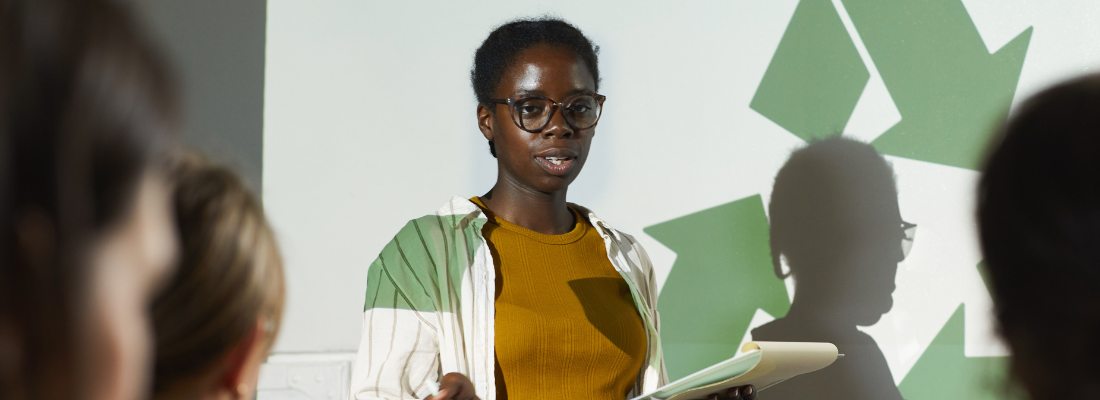


Here’s a question for leaders at forward-thinking organizations to ponder: why is diversity and inclusion important for sustainability?
At first glance, the two concepts seem very different – but a closer look reveals a very close (almost symbiotic) relationship within the business world. In fact, the 2021 edition of “Global Diversity, Equity, and Inclusion Benchmarks” Standards From Around the World (it’s a free download on www.centreforglobalinclusion) devotes an entire chapter to the connection, stating:
There is a clear link between the organization’s sustainability strategy (based on ESG – environmental, social, and governance – dimensions or factors) and the UN’s Sustainable Development Goals. The strategies for each initiative support the other, and opportunities for collaboration make both initiatives stronger. Leaders and practitioners in sustainability participate in the DEI initiative and vice versa. Both work with diverse stakeholders and report progress to the public.
The Centre also states that “Sustainability is the process of simultaneously pursuing: societal equity, workplace inclusion, economic prosperity & long term environmental health.” Going one step further, the concept of “regenerative sustainability” is also gaining traction throughout industries, with the goal of “thriving living systems in which whole-system health and wellbeing increase constantly.” Diversity and inclusion is sure to be at the epicenter of regenerative sustainability, as well.
So, for companies interested in the melding of sustainability and D&I, what are some of the best practices to show off their efforts (and assert their dedication) to internal and external sources?
Givaudian, a Swiss-based multinational flavor and fragrance manufacturer, puts “people” as a critical part of their entire sustainability strategy, stating on their website:
A leading inclusive employer by 2025
As the leading employer in the flavours and fragrances industry, with almost 16,000 employees from over 90 nationalities globally, we are committed to providing a safe, healthy and inclusive work environment where everyone loves to be and grow. We are committed to being among the leading employers for inclusion globally by 2025 and to improving how we care for all our people. Furthermore, we have committed that by 2030, 50% of our senior leaders will be women, and 50% will be from high growth markets.
Symrise, a flavor and fragrance producer based in Germany, includes a “Diversity Statement” as part of its “Sustainability” section, stating that:
Our Corporate Strategy reflects our core values and lever for sustainable growth. It is our belief that Creativity, Commitment, and Sustainability, three of our core values are fueled by Diversity and Inclusion.
Along with that statement, Symrise also highlights metrics on their Sustainability approach page – pointing out, for example, that the company boasts a “42% share of women at the second management level.”
The Swedish multinational home appliance manufacturer Electrolux hosts their diversity statements under their sustainability section, entitled “Better company.” The page pledges to “Act ethically, lead in diversity and respect human rights” and that:
We will earn the trust of everyone impacted by our operations, demonstrating our commitment to ethics, diversity and human rights through our words and actions. This includes working to ensure the health and safety of our employees, and promoting societal benefit through community investment activities.
Hewlett Packard, the United States-based tech giant, partially divides its sustainability section into “planet,” “people,” and “community” sections. “Championing dignity, respect, and empowerment for people everywhere” is the slogan for the “People” section, which sets DEI goals including:
Merck & Co., the pharmaceutical giant based out of New Jersey in the United States, reports on diversity and inclusion under “Employees” as part of its “Corporate Responsibility Report,” along with “Access to Health,” “Environment,” and “Ethics and Values.” Their “Diversity and Inclusion” section states:
We drive a globally diverse and more inclusive workforce for our employees by creating an environment of belonging, engagement, equity, and empowerment to support our mission of developing innovative medicines and vaccines to save and improve lives.
Finally, the Japanese-based food company Ezaki Gilco Co., Ltd. (commonly known as Gilco, makers of the famous “Pocky” chocolate-coated pretzel sticks) groups their diversity and inclusion efforts under the banner of Corporate Social Responsibility, or CSR. Diversity & Inclusion comes within “20 key issues” and “Materiality,” alongside “Contribution to people’s health,” “corporate governance,” “environmental and social considerations for the supply chain,” and many others. Their “Promotion of Diversity and Inclusion” section states that:
The Glico Group promotes diversity (participation by people with diverse characteristics). In terms of inclusion, we are strengthening measures to enable participation by the right person in the right place, regardless of age, gender, race, religion, special needs, or other characteristics.